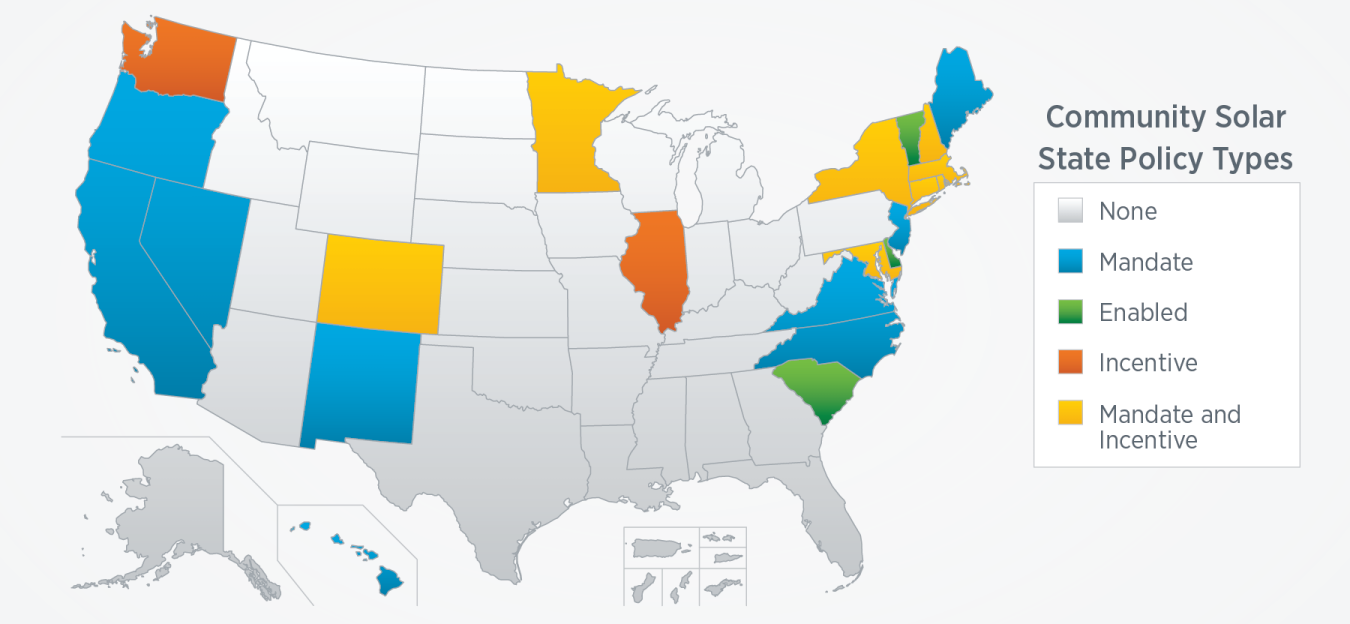Many states see community solar as a critical tool to ensure that all consumers–including low- and moderate-income (LMI) households–have access to clean, reliable electricity and that all communities realize the benefits of building our new clean energy economy. As of December 2021, 22 states and Washington, D.C. have policies that support community solar deployment. These policies are a combination of mandated levels of community solar deployment, incentives for deployment, policies that make deployment easier, or some combination of these. While at least one community solar project exists in 39 states, Washington, D.C., and Puerto Rico, nearly three-quarters of the market is concentrated in just four states (Minnesota, New York, Massachusetts, and Florida).

State engagement is one of the five National Community Solar Partnership initiatives on its Pathway to Success.
States Collaborative
Member States
Alaska
Connecticut
District of Columbia
Illinois
Maine
Massachusetts
Michigan
New Jersey
New Mexico
New York
Oregon
Rhode Island
South Carolina
US Virgin Islands
Virginia
Washington
West Virginia
NCSP conducted multiple stakeholder engagement events with state partners in 2021 to understand the barriers to equitable deployment of community solar across all states. NCSP heard that state partners at all levels of market maturity (new markets, emerging markets, and mature markets) would benefit from regular opportunities to engage with and learn from their peers in other states as they explore, design, launch, administer, and expand community solar programs in their states. Read the summary of lessons learned from states for accelerated community solar deployment.
To address this need, the NCSP States Collaborative:
- Serves as a knowledge hub and a support network to help state actors (representatives from state energy offices, regulatory agencies, program administrators, and other critical partners) identify and overcome challenges as they work to expand affordable community solar access;
- Provides access to technical and analytical assistance as states seek to explore, launch, or expand community solar programs and maximize the benefits of deploying more clean energy;
- Facilitates peer networking to address barriers that states face when setting goals, designing and implementing community solar programs for their residents, and identifying and amplifying best practices;
- Develops relevant resources, discussions, topical briefings, and workshops with support from the DOE, its National Lab partners, and third-party advisors; and
- Supports and recognizes states’ efforts on community solar.
By joining the NCSP States Collaborative, member States agree to develop community solar deployment goals and track and report on their progress towards these goals. NCSP will support states in developing and implementing plans to meet their stated goals. It will also promote and recognize public goals that are aligned with targets and metrics from NCSP and the Justice40 initiative.
Download the NCSP States Collaborative fact sheet.
Join the partnership and email community.solar@ee.doe.gov to participate in the States Collaborative.